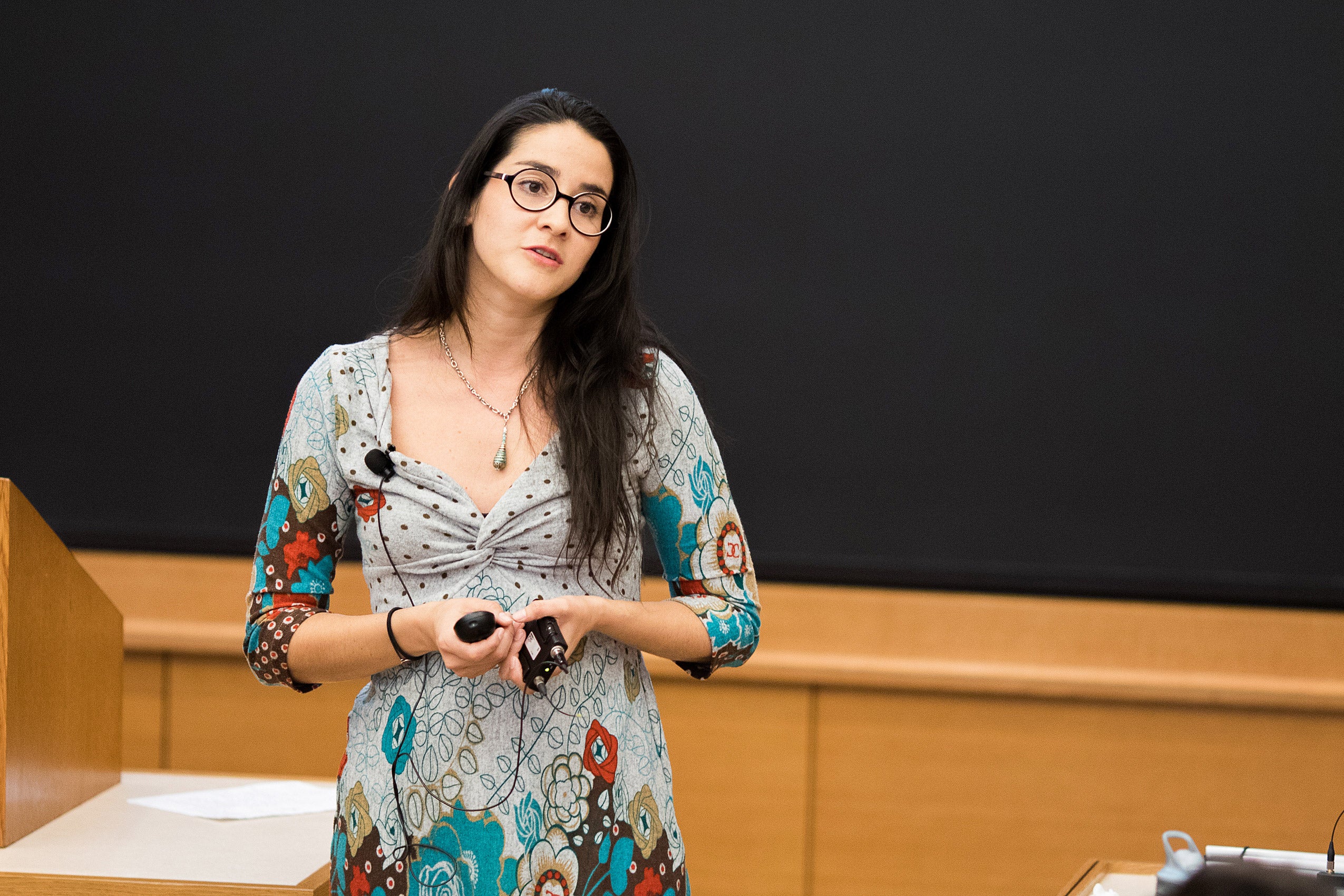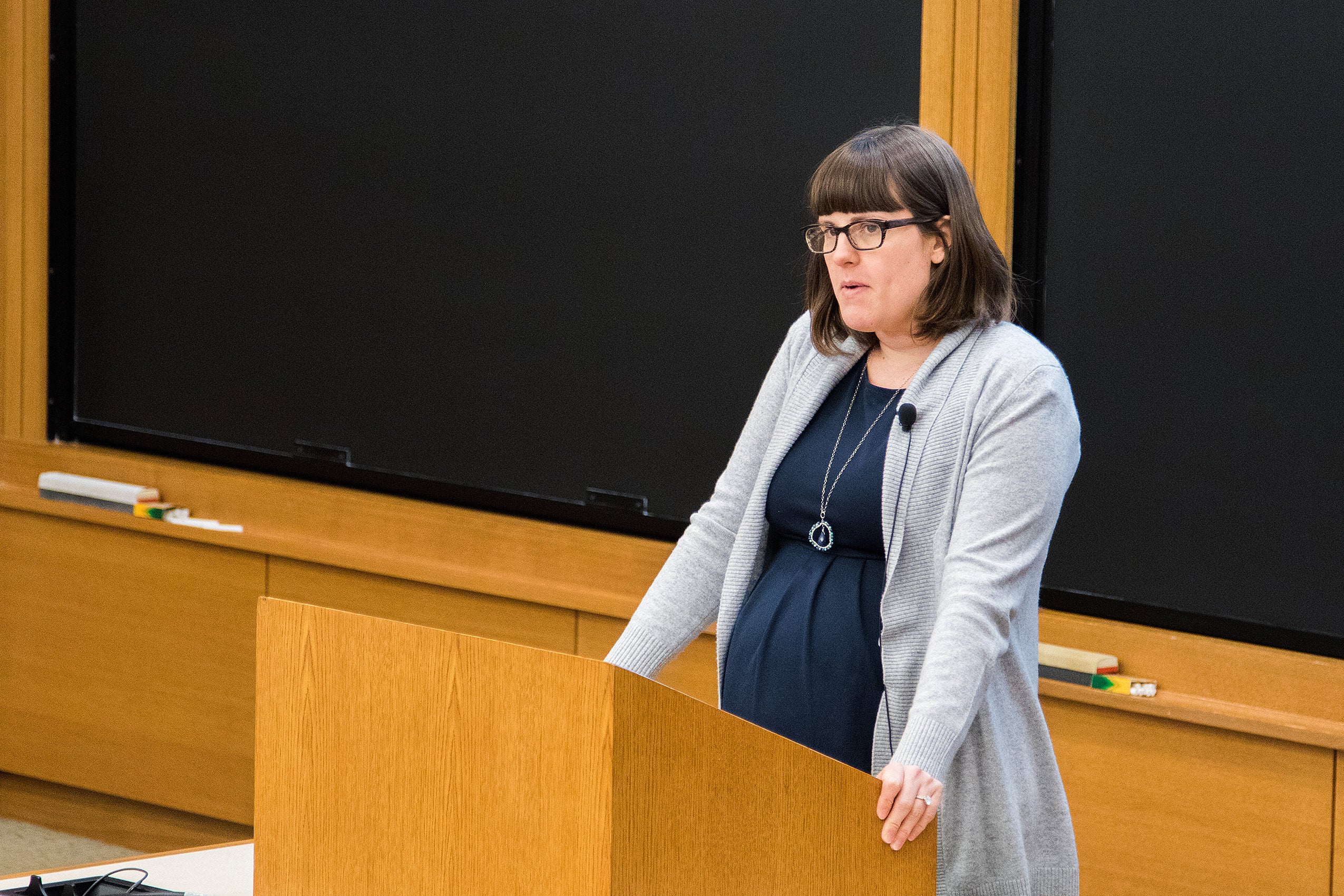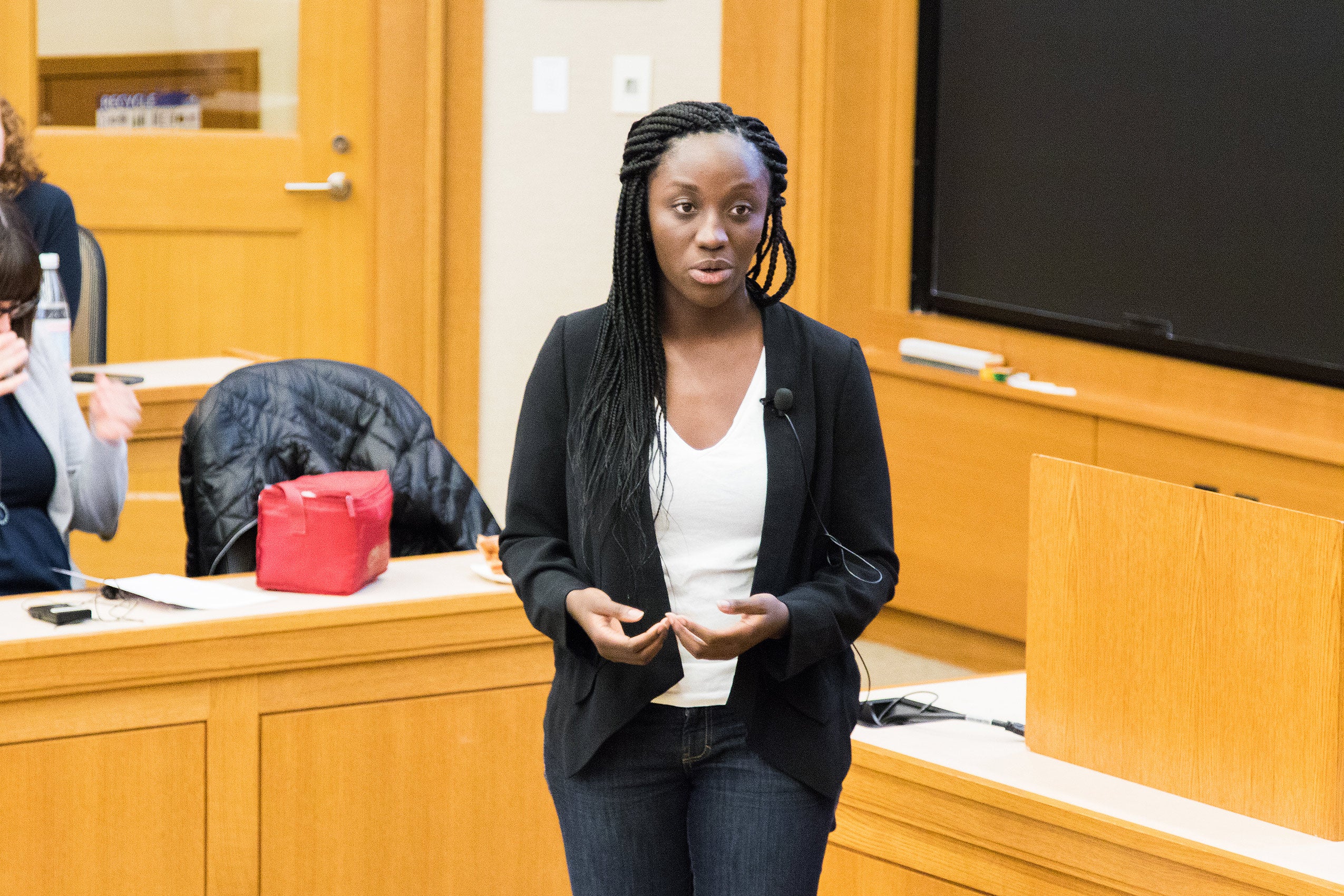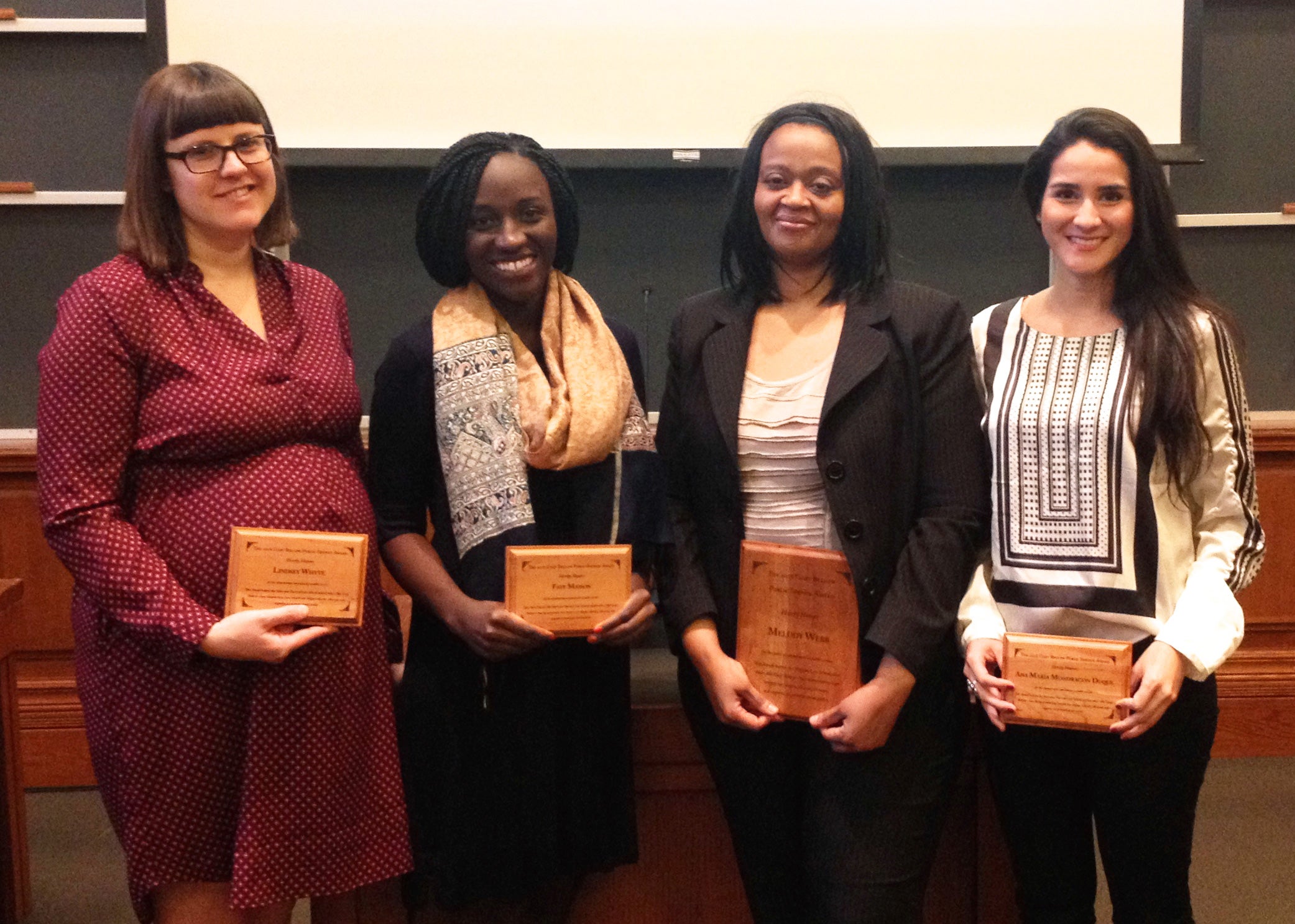Four members of the Harvard Law School community—Ana María Mondragon Duque LL.M. ’16, Lindsey Whyte ’16, Faye Maison ’16, and Melody Webb ’93—received the Gary Bellow Public Service Award, established in 2001 in memory of the late Professor Gary Bellow ’60, a pioneering public interest lawyer who founded and directed Harvard Law School’s clinical programs.
Each year, the student body selects a student and an alumnus/a who best exemplify Bellow’s commitment to advancing social justice through law. The award committee expanded the award this year to recognize the work of an LL.M./S.J.D. graduate and two graduating students. Also this year, the Bellow Award committee hosted a TED-style talk event prior to online student voting for award finalists to share their public service vision and experience.
This year’s award winners were honored at an HLS reception on April 11. Event organizers Olivia Warren ’17 and Colin Doyle ’17 opened the ceremony by reading a 1993 quotation from Bellow: “One of the things that Harvard Law School clearly teaches our students is that good or bad, it’s important to be important. That’s not the message that I want to communicate. I want them to be learners. Thoughtful analyzers of the world, intelligent changers of their own behavior, respectful of the complexity of the world that they’re going to live in, fascinated with what a life of learning in law will involve over an entire lifetime.”
In introductory remarks, Dean Martha Minow recalled how, before she went to law school, she had heard about Bellow’s work representing the Black Panthers and farm workers in California and thought, “Wow, you can do that as a lawyer?”
Minow shared three lessons she learned from Bellow: “One, that chaos is actually a productive work environment. Two, that it is possible to find ways to have fun while you’re doing social justice work. Three, that relationships of trust where you actually criticize each other and push each other are central to the work.”
This year’s honorees have worked in a wide variety of areas—including civil rights, human rights, domestic violence and education—to educate, advocate and organize to promote social justice.
Ana María Mondragon Duque LL.M. ’16

Prior to attending Harvard on a Fulbright scholarship, student award recipient Ana María Mondragon Duque LLM ’16 founded an NGO called “Spirit of the Constitution of 1991 (E-91)” in response to the political and social crisis of her home country, Colombia. At organizations such as the Inter-American Court of Human Rights, the Center for Justice and International Law (CEJIL) in San José, Costa Rica, and the Interamerican Association for Environmental Defense (AIDA) in Mexico City, San Francisco and Bogota, Mondragon has worked on cases involving the rights of indigenous peoples, human rights defense, LGBTIQ rights, and environmental and social issues caused by the implementation of development projects and corporate activities.
In her acceptance speech, Mondragon encouraged audience members to ask themselves about Harvard Law School’s role in promoting social justice through legal education. “What’s Harvard Law School doing to preserve those values that Gary Bellow was advocating for, and which are going to be the next steps of this school to promote a faculty and to promote students that believe this path is legitimate, that are denouncing systemic injustices right now, and that are demanding a legal education that equips them to respond to these injustices?”
“I came here to do my masters because I believe that Harvard can be an element of change in the world,” she said.
Lindsey Whyte ’16

Lindsey Whyte ’16 has served on the board of the Harvard Defenders for two years. Through the Tenant Advocacy Project, she has also assisted clients facing denial of subsidized housing as a result of alleged criminal activity. As a student attorney and board member of the Harvard Legal Aid Bureau, Whyte argued a housing case before the Massachusetts Court of Appeals in the fall of 2015.
“Clinical education represents a tremendous opportunity, but also a tremendous privilege,” Whyte said. “A heavy and sometimes overwhelming responsibility—because you’re a student, but you’re also entrusted with matters that have a significant impact on your clients’ lives. You’re a student, and your clients are in some sense asked to take on the role of your teacher, on top of the many other roles that their lives demand of them. You’re a student, and sometimes you will make mistakes.”
Prior to law school, Whyte helped create a pro se legal advocacy program for survivors of domestic violence in rural Montana. She also advocated for individuals facing denial and termination from public assistance programs and helped administer an emergency eviction defense legal clinic in Seattle. She had thought she was good at listening already, Whyte said, but clinical work at Harvard taught her to pay even closer attention to her clients’ individual experiences of their circumstances.
“Law school trains us to do a lot of thinking, a lot of talking, and a lot of leading. But truly to attack the system that enmeshes consequences and penalties for our clients and retains injustice and exclusion in our institutions, in which we function as lawyers, we must also learn to adopt a stance of listening, curiosity, and following,” she said.
Whyte has previously worked at the Bronx Defenders and the King County Department of Public Defense. After clerking on the State Supreme Court of Washington, she will pursue a career in public defense.
Faye Maison ’16

Faye Maison ’16 will serve as a juvenile public defender in Maryland after graduation, building on her previous work in inequality and client advocacy through the Committee for Public Counsel Services through the Child Advocacy Clinic, the Criminal Justice Institute, and the Mecklenburg County Public Defender Office.
Before law school, Maison focused on education issues, serving as a director of SCHOLAR, an intensive science program for public school students in New Haven; a Woodbridge Fellow, a fellowship in higher education administration at Yale University; and as a fellow with Medic Mobile working on community education in Bangladesh. At HLS, Maison co-founded Students for Inclusion, an organization that empowers students to take ownership of their legal education.
In her acceptance speech, Maison focused on the theme of “love and different expressions of love,” and she recalled Minow’s words of support after the first Harvard Law School community meeting of the past year. “I have never been in a space where so many people were sharing their emotions about themselves and America and about our justice system, and were truly showing love for each other and love for all of each other as part of a Harvard Law School community,” Maison said.
Maison’s voice became emotional as she discussed how student activists in Belinda Hall are working to model a “space that they love and a type of legal education that they would love to see at this school.” She urged the audience to see, “when we look at the work that people are doing, when we see activists, when we see organizers, when we see people continuing to fight for indigenous communities in Colombia, when we see people doing public defense work, when we see people doing the hard case—that so much of that is out of love.”
“No matter what kind of work you are doing, I want you to think about the things that you love and continue to allow yourself to be compelled to do the work that you love, because it’s when we think about the world that we want to love—I think it’s when we can make the most change,” she said.
“When we can have a ten-year-old say, ‘I love my education; I love the books I’m reading,’ when we can have a law students say, ‘I love my education; I love the legal education that I’m getting,’ and when we can have all of us saying, ‘I love my community, I love the community that we’ve created,’ I think we’ve done an amazing thing,” Maison said. “And I think this is some of what Gary Bellow was advocating for, and what this award advocates for, and what I’d like to encourage all of us to leave and advocate for.”
Melody Webb ’93
This year’s alumni award recipient, Melody Webb ’93, began her acceptance speech by honoring her guest for the night—her high school social studies teacher, Dr. Billie Day. “It’s such an honor to be here with my favorite high school teacher to honor one of my favorite law school professors,” she said. Webb immersed herself in the clinical program run by Bellow during her law school years, and she described how those experiences impacted the kind of lawyer she became.
Webb has worked on a wide range of public interest issues in the Washington, D.C. area: she created a conflict resolution program for at-risk youth as an Equal Justice Works Fellow; testified before Congress on behalf of the homeless for the Washington Legal Clinic for the Homeless; restored thousands of minority voters to voter rolls in Virginia through the Service Employees International Union; and fought against employment discrimination as Legal Director of the Employment Justice Center. She also founded Lobbyline.com to advocate for D.C. residents affected by lead in water, and also created Mother’s Outreach Network to provide legal education and resources for low-income mothers.
Webb’s speech focused on what it means to be a public interest lawyer. “My seventeen-year-old paid me the highest compliment when he said, in answer to one of his college essay questions, “Who do you admire and why?” He answered, “My mom. It’s because she fights for the little guy.”
“Now, I don’t think he was flattering me to get the keys to the Mercedes—because we don’t have one,” Webb joked. “But I do think it goes to his perception of my work. With your Harvard Law degrees, like the namesake of this award, you too will fight for the little guys. That is what it is to be a public interest lawyer. It’s a noble and good fight.”
Webb offered some guidelines for building a “dignity-centered practice of law,” encouraging audience members to “check and recheck” that you are representing your client’s interests; start with a practice area that intersects with your own interests but do not fear branching out into related areas; and “practice social change, but practice it one client and one community at a time, lest they become nameless and faceless.”
“Go forth, you brilliant people: you champions of the little guy,” she said. “Practice deeply, advancing your clients’ overall well-being. Practice at the nitty-gritty.”
